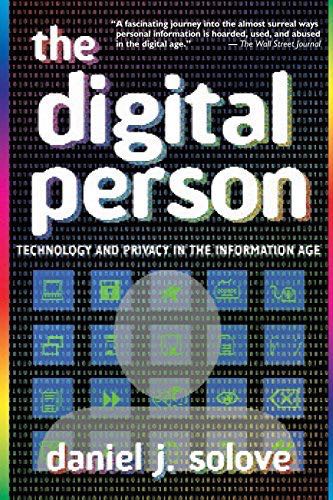The Digital Person: Technology And Privacy In The Information Age
Reviewed date: 2007 Oct 3
228 pages
The Digital Person is a fascinating book on privacy in the digital age. Daniel J. Solove says the whole privacy debate has been affected by the Big Brother metaphor. George Orwell's novel 1984 portrays a world of total surveillance, where liberty and independent thought are stamped out by technology that allows the government to monitor all citizens at all times. The Big Brother metaphor is so prevalent that any discussion of privacy immediately focuses on surveillance. That's a false trail, Solove says.
The privacy problem in the digital age is not surveillance. It is bureaucracy. Solove offers a different story to illustrate: Kafka's The Trial. In Kafka's story, a nameless, faceless bureaucracy accuses the protagonist, Joseph K., of an unspecified crime. K. can find no further information; despite his attempts to penetrate the bureaucracy, he is never able to ascertain what he has been accused of, who has accused him, or what the punishment might be. This mysterious, impenetrable bureaucracy is a better metaphor for the privacy issues of the digital age.
The problems today are not with surveillance or the violation of one's privacy. Instead, it is the aggregation of innocuous data--names, phone numbers, addresses, biographical information, family history, and all sorts of public records--into the databases of large private companies. These companies are doing nothing more than aggregating and correlating data that is already available. The problem is, the sheer amount of data available today allows these corporations--which are unaccountable to the public, and which the public usually don't even know about--to compile detailed digital dossiers on people. Such dossiers have a real effect on people's lives.
For example, credit bureaus keep records of credit history, bank accounts, employment, places of residence, and criminal records. The average person has no idea what is in his credit report--and yet an employer might decide not to hire an applicant because of the contents of her credit report. The credit report might be mistaken or in error, but the individual has no way to hold the credit bureau accountable for the error, even if she is aware that an error exists.
This problem cannot be understood in terms of the Orwell metaphor. The credit bureaus are not spying on citizens, they are merely aggregating and correlating innocuous information that is already in the public domain. This privacy problem can only be understood in terms of the Kafka metaphor. Solove believes these Kafka privacy problems cannot be solved by the free market.
Understanding the privacy problem of databases in terms of the Kafka metaphor--our helplessness and vulnerability in the face of powerful bureaucracies that handle our personal data--reveals there are several deficiencies in market solutions.
The free market cannot resolve the Kafka privacy issues because markets only work well when there is a relatively free flow of information. In the case of databases and digital dossiers, the citizen has no knowledge of the dossier or the corporation that is using the dossier. Without knowledge, the citizens cannot defend his interests. The free market fails to provide a solution. This is what Solove calls an "architectural" problem in the marketplace, and it can only be solved by imposing legislation to fix the architecture.
Solove suggests that instead of handling privacy rights through tort law, as has been the custom, privacy must be handled by restricting the ability of companies to compile and use public data without oversight. Instead of making government records public, the government should release records only under strict licenses. These licenses will allow the information to be used for noncommercial purposes--thus allowing free access to information in the political arena and anywhere else that free speech is sacrosanct--but prevent companies from using information for mere commerce.
Additionally, Solove suggests that greater transparency be required. Companies that assemble digital dossiers on citizens must give citizens the ability to correct those dossiers, and to see how they are being used. The bureaucracy must be responsive to the people it affects.
